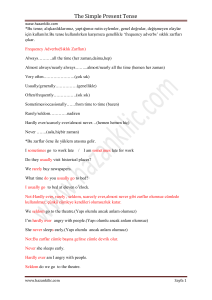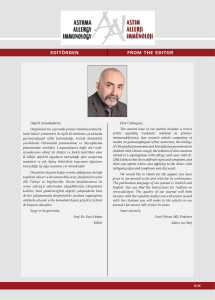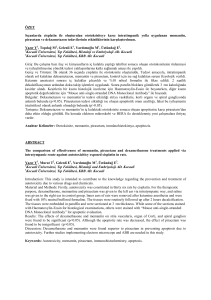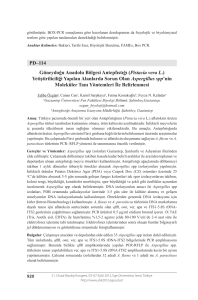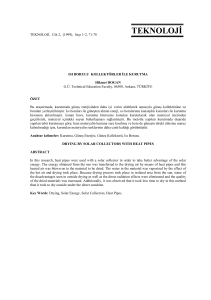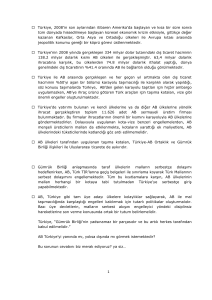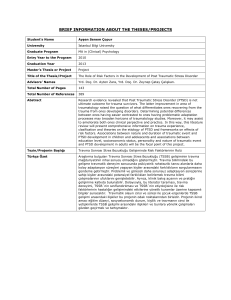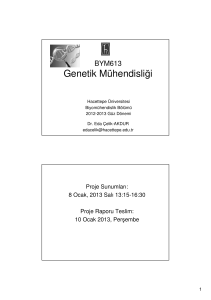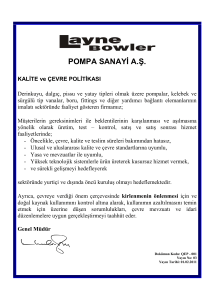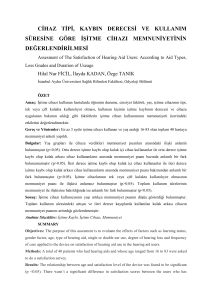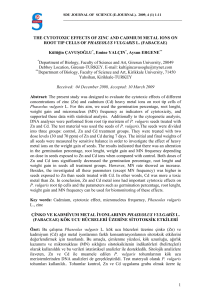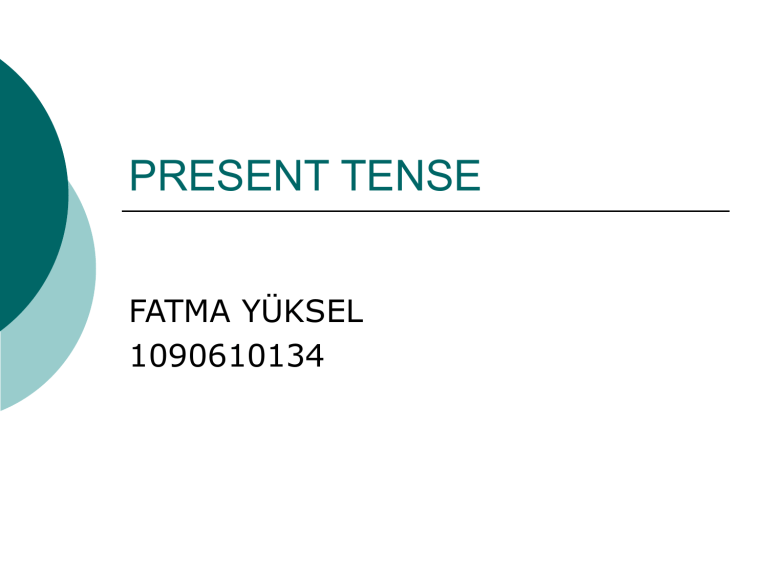
PRESENT TENSE
FATMA YÜKSEL
1090610134
FORMS OF THE SİMPLE PRESENT
TENSE
Affirmative:
I get up early.
You go on holiday every year.
He studies hard.
She cleans the house herself.
It stands in the corner.
We keep our promises.
You like animals.
They help people around.
Negative:
I don’t get up early.
You don’t go on holiday every year.
He doesn’t study hard.
She doesn’t clean the house herself.
It doesn’t stand in the corner.
We don’t keep our promises.
You don’t like animals.
They don’t help people around.
Interrogative:
Do I get up early?
Do you go on holiday every year?
Does she study hard?
Does she clean the house herself?
Does it stand in the corner?
Do we keep our promises?
Do you like animals?
Do they help people around?
Üçüncü tekil şahıs için (he/she/it) fiil,
olumlu cümlede –s takısı alır.
He reads a lot.
She buys a newspaper regularly.
The cat drinks only milk in the morning.
Olumsuz cümlede ve soruda, yani “does” ya
da “doesn’t” bulunan cümlelerde fiil daima
yalındır.
He doesn’t read a lot.
Does the cat drink milk in the morning?
“have” fiilinin üçüncü şahıs biçimi “has”dir.
Ancak, soruda ve olumsuz cümlede fiilin yalı hali
“have” kullanılır.
-Do you have a bath every day?
-Yes, I do. (I have a bath every day.)
USE OF THE SIMPLE PRESENT
TENSE
Bu tense ile genelde yaptığımız işleri,
alışkanlıklarımızı anlatırız ve
always,sometimes,never, often vb
sıklık bildiren zarfların yanı sıra,
every day,every month,every year,
every summer gibi zaman zarflarını
sıkça kullanırız.
-
-
-
-
What time do you usually get up?
I usually get up at seven o’clock.
Does she always get up early?
Not always. She sometimes gets up very
late.
How often does your mother write to you?
She writes to me very often.
Frequency adverbs(sıklık bildiren zaman zarfları)
Always=all the time(hep,her zaman)
Almost always/nearly always=almost(hemen her
zaman)
Very often=(çok sık)
Usually/generally=(genellikle)
Often/frequently=(sık sık)
Sometimes/occasionally=from time to
time(bazen, ara sıra)
Rarely/seldom=(nadiren)
Hardly ever/scarcely ever/almost
never=(neredeyse hiç)
Never=(asla)
Yardımcı fiil bulunmayan olumlu
cümlelerde bu zarflar asıl fiilden
önce, yani özne ile yüklem arasında
yer alır.
she always sings in English.
I sometimes feel depressed.
They seldom go to the theatre.
Bu zarflar “am, is,are” dan sonra gelir.
I sometimes go to work late.
I am sometimes late for work.
Sıklık bildiren zarfların olumsuz
cümledeki yeri değişiktir. Always her
zaman olumsuzluk eki “not”tan
sonra gelir.
I don`t always get up early.
She doesn’t always study very hard.
They aren’t always late for class.
frequently,sometimes, occasionally
olumsuzluk ekinden önce gelir.
I sometimes don’t want to be with
people.
She frequently doesn’t want to do
her homework.
They sometimes aren’t ready on
time.
She occasionally isn’t polite to the
people around her.
NOTE
Birinci tekil şahıs için bu kural geçerli
değildir. Zarf, yardımcı fiil “am” ile
“not” arasında yer alır.
I am sometimes not patient
enough with children.
Usually, generally, often her iki durumda da
kullanılır.
They usually don’t go out on
Sundays./They don’t usually go out on
Sundays.
We often don`
‘t watch tv./We don’t often watch tv.
They generally aren’t awake till 11
a.m/They aren’t generally awake till
11a.m.
rarely, seldom, hardly ever, almost
never, never olumsuz cümlede
kullanılmaz. Bu zarflar sadece
olumlu cümlede kullanılır, ancak
olumsuz bir anlam taşır.
I hardly ever go to the theatre.
I am hardly ever nervous before an
exam.
She never comes to her classes on
time.
Olumlu anlam taşıyan sıklık zarflarını
dilbilgisi kurallarına uygun bu
kullanımlarının yanı sıra, cümlede
vurguyu artırmak için, cümlenin başında
da kullanabiliriz. Özellikle sometimes bu
şekilde çok sık kullanılır.
Sometimes I get angry easily.
Occasionally I don’t need to get up early.
Usually they spend too much money on
luxuries.
Occasionally ve sometimes cümle
sonunda da yer alır.
I go to the theatre occasionally.
He is a bit lazy sometimes.
Often özellikle quite ve very ile
birlikte kullanıldığında cümle
sonunda yer alabilir.
We come to this restaurant quite
often.
Do you catch colds often?
I don’t watch tv very often.
Rarely, seldom, özellikle only, very ve
quite ile birlikte kullanıldığında,
cümle sonunda yer alabilir.
I eat meat very seldom.
She smoke cigars quite rarely.
NOTE
Always bu şekilde cümle başında ya
da sonunda yer almaz.
Olumsuz anlam taşıyan sıklık zarfları
cümlenin başına geldiği zaman
cümle devrik olur.
Never do I eat fish. (I never eat
fish.)
Rarely does he smoke.
Seldom do you make mistakes.
Scarcely ever does she visit us.
Ever olumlu veya olumsuz soruda
kullanılır ve hiç anlamını verir.
Olumsuz cümlede hiç demek için do
not ever yerine never kullanılır.
- Do you ever smoke?
- No. I never smoke.
-
Don’t you ever help your mother?
Yes. I help her when I have time.
Doğa kanunlarını, her zaman geçerliliği olan
doğruları ve genellemeleri bu tense ile
ifade ederiz.
A diamond is a precious stone.
Water consists of oxygen and hydrogen.
The Earth revolves round the Sun.
Plants need water in order to grow.
Water boils at 100 degrees centigrade.
Wood floats in water but iron sinks.
`what do you do?` sorusu kişinin
neyle uğraştığını, işini sorar. Yani
`what is your job/occupation?`
sorusu ile aynı anlamdadır.
- What do you do?
- I am a teacher.
-
What does your father do?
He is an accountant.
`what do you do?` sorusunu bir
zaman zarfıyla kullanırsak, “sözü
edilen zamanda ne yaparsın”
anlamına gelir.
- What do you do at the weekends?
- I usually meet friends.
-
What does your father do in the
evenings?
He reads his newspaper or watches
television.
-why don’t……..? Kalıbı birine öneri
getirirken kullanılır.
- I have a headache.
- Why don’t you take an aspirin?
-
We have nothing to eat at home.
Why don’t we go out for dinner.
NOTE
`why don’t you get up early in the
mornings?`
`I can’t because I usually go to bed late.`
ifadesinde `why don’t you….?` gerçek bir
soru özelliği taşır ve kişi yanıt verilmesini
bekler. Ancak:
`I am too tired.`
`why don’t you lie down and
rest?`ifadesinde, `why don’t you…..?`
yapı olarak soru olmasına karşın, kendisi
bir yanıttır ve öneri getirir.
Sinema, tiyatro gibi etkinliklerin başlama ve bitiş
saatlerini, ders programlarını ya da uçak, tren,
otobüs tarifelerini belirtirken, geniş zamanı
gelecek zaman anlamıyla kullanabiliriz.
The buses start at a.m and stop at 12 a.m every
day. (simple present)
The train to Ankara leaves at 9 a.m tomorrow and
arrives there at 6 p.m (future)
Our classes usually begin at 9 and finish at
12.(simple present)
My class begins at 9 tomorrow at finishes at
12.(future)
Gazete manşetlerinde, normalde past
tense ile aktarılması gereken
olaylar, Simple Present Tense ile
aktarılır.
A live bomb blows up a shopping
centre in Israel. (=blew up)
A coach collides with a train in
India: hundreds killed and hundreds
more wounded. (=collided)

